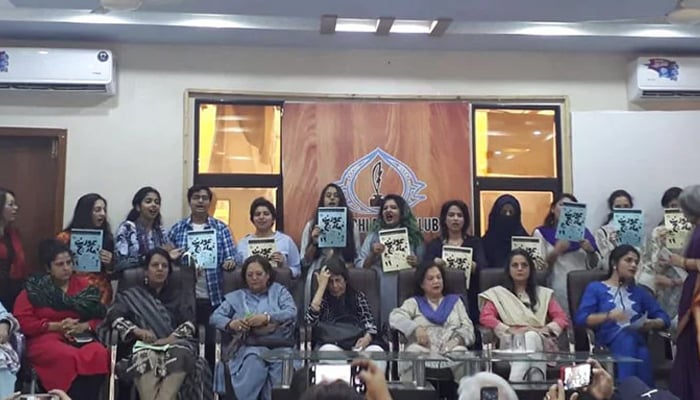Women experts detail why Aurat March 2020 is necessary
The event, addressed by experts from various sections of the society, shed light on the march and its demands
The Aurat March 2020 organisers apprised the journalist fraternity of its charter of demands in a press conference held here at the Karachi Press Club on Tuesday, introducing a panel of experts who work in spaces directly related to its demands.
The event, addressed by experts from various sections of the society, shed light on the march and its demands.
The march, aiming to unite women, transgenders and non-binary people, demanded an end to violence and sexual harassment, economic justice, reproductive rights, minority rights, political participation of women among others.
‘No transgender rape law’
Transgender activist Shahzadi articulated the demands of the trans community, saying that even when the first women march happened they put their weight behind them.
“Unfortunately, to date, there has been no transgender rape law made in Pakistan,” they lamented.
Shahzadi said that they want a separate law for rape as lodging an FIR even leads to insensitive and explicit questions from policemen.
“Trans persons should have representation, whether in province or centre,” said Shahzadi, adding that they should also be a part of the political process.
They lamented that since 2010 every government announced a 5% quota but this was never implemented. The transgender commission under the Transgender Bill 2017 and 2018 to date hasn’t been formed.
There are neither any separate jails for transgender persons nor law, said Shahzadi.
“We are called for inaugurations, but the government does not hold any discussion with us, “ Shahzadi said, stating that a complaint desk has been formed but not a single trans person has been hired to work on it.
Economic participation
Senior finance journalist Afshan Subohi spoke on the aspect of economic empowerment, saying that women hardly have any decision-making role in economic issues.
“Nobody knows better than homemakers how to resolve issues with the least resources,” she said.
According to the figures she presented, only ’30%’ of women or housemakers contribute to Pakistan's GDP.
Social sector researcher Nazish Brohi discussed the political representation of women, saying that the new generation’s idea of Aurat March has breathed fresh air into the political process, as it is more conducive for raising voice in legislation.
“If we find the demands of women controversial, at one time women having own CNICs was controversial too,” she told the audience.
She said that women’s participation goes a long way.
Women's voting rights may not seem to be a big deal right now, but in every election, this controversy reared its head that a small agreement was in place where women would not be allowed to cast votes and most political parties were implicit in it.
Brohi said that it wasn’t possible nowadays due to lack of female political participation can lead to cancellation of the voting process.
“These changes have been made primarily due to the work of women sitting inside the parliament,” said Brohi.
Reproductive rights
University Professor Shama Dossa spoke on female reproductive rights and the agency over their bodies.
Reproductive and sexual rights are basic human rights, she said, adding that women should exercise some agency over their bodies and make own decisions regarding it.
“In Pakistan, the maternal mortality rate is 276, which is a cause of extreme shame for us. Every 37 minutes a woman dies,” said Dossa, reflecting that it was basically due to linked to lack of awareness and medical facilities.
She said that the Sindh was the first province to introduce the Sindh Reproductive Rights Act.
Forced conversions and minority rights
Minority rights activist Ghazala Shafiq said that the main issue was forced conversions, which destroys the fabric of our society.
“Conversion happens in one day, and in the same day marriage takes place,” she said.
She said that the provincial government should take note that the bill related to forced conversions has been pending for the past two years and it should be converted into a bill through legislation.
Another rights activist, Safina Javed, demanded that an impartial commission should be made to safeguard the rights of minorities which are vulnerable to mob violence.
Role of media
Journalist Uzma Alkarim lauded media for covering issues related to women, adding that the role of journalists is to highlight pertinent issues with due diligence when it comes to sensitive issues.
She emphasized on sensitization of law enforcement agencies’ personnel and media persons.
-
Security forces gun down 30 terrorists in multiple IBOs in KP: ISPR
-
MQM-P calls for new province in Sindh
-
US report validates Pakistan military edge over India: PM
-
Banned TTP poses serious threat to Pakistan security: UNSC panel
-
CM Afridi clarifies remarks on by-poll after ECP requests army deployment
-
Dubai sees 3.2m Pakistani passengers in 2025 as airport sets new milestone
-
Security forces kill 23 Indian proxy terrorists in KP's Kurram
-
Pakistan to construct island to boost oil exploration: report












